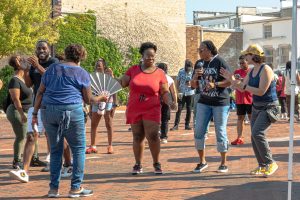Panel addresses Persian Gulf ‘slaughter’
February 20, 1991
The “carnage” in the Gulf came under criticism Tuesday during a panel discussion featuring five anti-war speakers.
About 70 people attended the “Calming The Storm: How Can We Stop The War!” teach-in at the Carl Sandburg Auditorium.
Rosemarie Slavenas, an associate professor of education, is the mother of a marine stationed in Saudi Arabia.
“My heart is broken for those people whose war is over,” she said. “I’m talking about the people whose children have been sent home in one of the 40,000 body bags Bush ordered in August.
“The U.S. can’t afford to win any more wars. We need to lose some wars so our old factories can be rebuilt,” Slavenas said.
Bill Davis, organizer for Vietnam Veterans Against the War, also spoke of financial concerns.
“There is not enough room for our veterans in the VA hospitals today, so how could we afford to take care of the ones in the Gulf today?” he asked.
“War profiteering is a sick business and businessmen out there are licking their chops,” said Davis, referring to an advertisement for T-shirts in support of the troops.
Janet Afary, an Iranian woman and Middle East historian from the University of Michigan, said this has been the most concentrated bombing ever and there is no way to tell how many have died.
She also questioned U.S. support of certain countries.
“Syria is one of the worst human rights countries in the world, along with Saudi Arabia, and our government wants us to support them,” she said.
The Rev. Marshal Hatch, an organizer of Citizens against Desert Storm, a black community organization in Chicago, said “we should be sickened by this hoax on the American people.
“Flag-wavers and yellow-ribbon wearers around the world are uninformed as to why we are out in the Middle East,” he said. “It is not militarism and cheap oil that constitutes the American way of life.”
Bassima Bazirgan, an Iraqi woman and Middle East librarian at the University of Chicago, did not prepare any written words.
“You don’t write or prepare your feelings,” she said. “I hear from my American friends and they tell me they can’t imagine how this conflict is tearing me up.”






